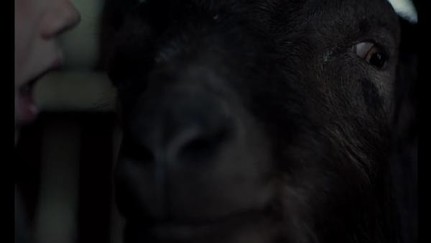The result of all this historical immersion is a transporting experience from frame one. William's (Ralph Ineson) family is being expelled from a settlement for taking a position to the right of the already-stringent religious leaders. Eggers films this sequence from the perspective of William's oldest daughter Thomasin (Anya Taylor-Joy), with her looking at the torsos of her leaders as they decide hers and her family's fates. In a film laden with several shocking, resonant images, The Witch gets the most stress-inducing one out of the way early. Barely five minutes into the film, the family has packed their wagon and venture out from the settlement into the vast, unknowable wilderness, with the wagon getting smaller as it leaves the previously-friendly gates into territory less hostile than utterly indifferent, to paraphrase Kubrick. The family of seven eventually find a plot to develop, but for all his piety, William is not the best farmer or hunter, and the family suffers. Their most acute suffering awaits them, however, as it becomes clear very early in the film that all of the family's worst fears are real: there is a witch in the woods, and she knows they are there.
The external threat of the witch is personified quickly by Eggers, but the more unnerving aspects of his film is the way the family looks internally for corruption as well. William is shown to be a good father to his children, but he lives in a world where the bonds of family are not as strong as the bonds the devil can put on anyone. Eggers' script doesn't judge the characters, but he does judge the worldview, and he takes its worst excesses to their logical conclusion. That means none of the children, including the infant, are safe from the devil's corrupting influence, as Eggers sheds movie conventions as far as who is fair game in a horror film and who is not. It's as effective a method as any to put the viewer in a Puritan space. The characters can be obsessed with spiritual harm while the viewer can just focus on the physical variety.
The other side of this coin is a potential alternate film, where the family isn't threatened by an actual witch but their certainty that someone in their family has been corrupted. That alternative is one that would have to take swipes at the characters and damage the audience's buy-in, and one of Eggers' main priorities seems to be to treat his characters with as much respect as possible. The version of The Witch that is supernatural and validating Puritan fears walks the narrow path between shock that people lived like this, and empathy for them, too.
Whenever a director gives their actors, especially child actors, difficult language, it can be hit-or-miss, and The Witch adheres to that rule. Ineson and Kate Dickie, who plays the mother, take to the verbiage with no issues, and Ineson seems born to play this role. Taylor-Joy is also exceptional in the lead. Eggers spends a lot of time on just her face, and she's unafraid and capable of carrying the film. The younger actors all have a harder time, as expected, but it's never more than deserving of an eyebrow-raise. The potential break-out star of the film is a large goat named Black Phillip, who should get an Uggie-level of publicity out of The Witch. Large goats are already evocative of satanic imagery, and Eggers discovered one that matches anything found in a Hot Topic.
In a film driven by religion, The Witch chooses the Old Testament over the New. Eggers pulls no punches in his film, and a percentage of those angry CinemaScore respondents may have been driven away in the first 10 minutes, as The Witch toes a taboo line and then walks right over it. While not conventionally scary, it is without a doubt a film that puts the viewer off their comfort zone. Between the language, framing, score, and tone of the story, The Witch is a complete package designed to unnerve. In his debut, Eggers has crafted a modern horror classic, or maybe just a modern classic. A-

 RSS Feed
RSS Feed